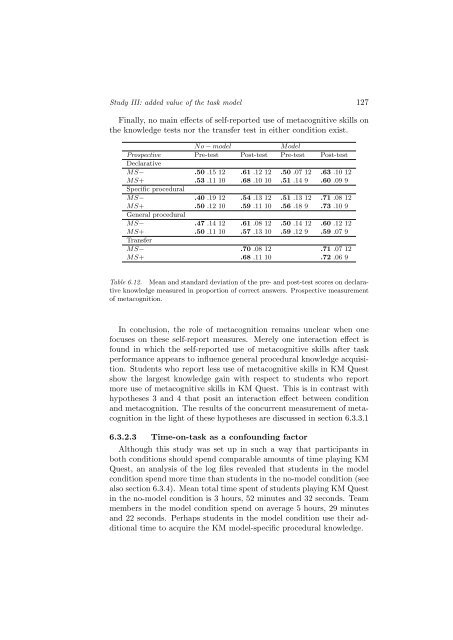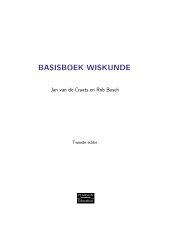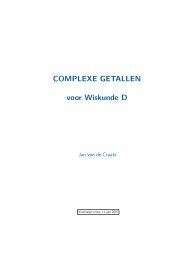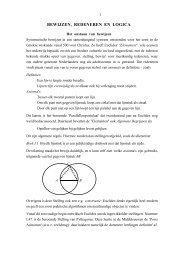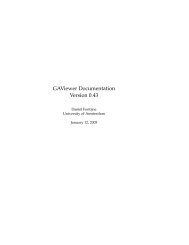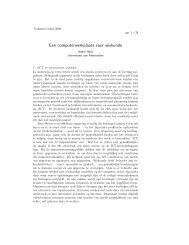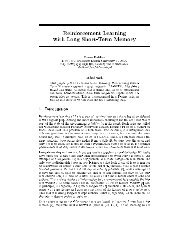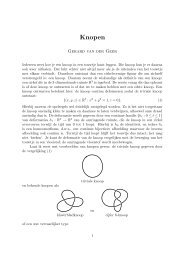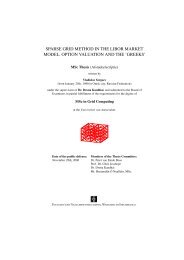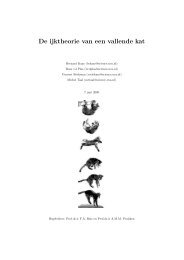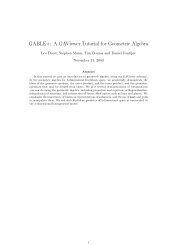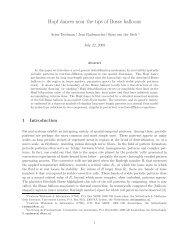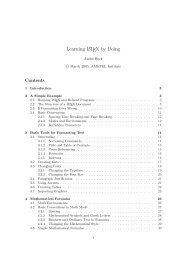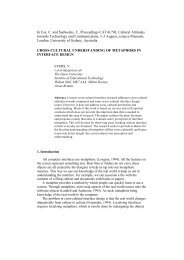The role of metacognitive skills in learning to solve problems
The role of metacognitive skills in learning to solve problems
The role of metacognitive skills in learning to solve problems
You also want an ePaper? Increase the reach of your titles
YUMPU automatically turns print PDFs into web optimized ePapers that Google loves.
Study III: added value <strong>of</strong> the task model 127<br />
F<strong>in</strong>ally, no ma<strong>in</strong> effects <strong>of</strong> self-reported use <strong>of</strong> <strong>metacognitive</strong> <strong>skills</strong> on<br />
the knowledge tests nor the transfer test <strong>in</strong> either condition exist.<br />
No − model<br />
Model<br />
Prospective Pre-test Post-test Pre-test Post-test<br />
Declarative<br />
MS− .50 .15 12 .61 .12 12 .50 .07 12 .63 .10 12<br />
MS+ .53 .11 10 .68 .10 10 .51 .14 9 .60 .09 9<br />
Specific procedural<br />
MS− .40 .19 12 .54 .13 12 .51 .13 12 .71 .08 12<br />
MS+ .50 .12 10 .59 .11 10 .56 .18 9 .73 .10 9<br />
General procedural<br />
MS− .47 .14 12 .61 .08 12 .50 .14 12 .60 .12 12<br />
MS+ .50 .11 10 .57 .13 10 .59 .12 9 .59 .07 9<br />
Transfer<br />
MS− .70 .08 12 .71 .07 12<br />
MS+ .68 .11 10 .72 .06 9<br />
Table 6.12. Mean and standard deviation <strong>of</strong> the pre- and post-test scores on declarative<br />
knowledge measured <strong>in</strong> proportion <strong>of</strong> correct answers. Prospective measurement<br />
<strong>of</strong> metacognition.<br />
In conclusion, the <strong>role</strong> <strong>of</strong> metacognition rema<strong>in</strong>s unclear when one<br />
focuses on these self-report measures. Merely one <strong>in</strong>teraction effect is<br />
found <strong>in</strong> which the self-reported use <strong>of</strong> <strong>metacognitive</strong> <strong>skills</strong> after task<br />
performance appears <strong>to</strong> <strong>in</strong>fluence general procedural knowledge acquisition.<br />
Students who report less use <strong>of</strong> <strong>metacognitive</strong> <strong>skills</strong> <strong>in</strong> KM Quest<br />
show the largest knowledge ga<strong>in</strong> with respect <strong>to</strong> students who report<br />
more use <strong>of</strong> <strong>metacognitive</strong> <strong>skills</strong> <strong>in</strong> KM Quest. This is <strong>in</strong> contrast with<br />
hypotheses 3 and 4 that posit an <strong>in</strong>teraction effect between condition<br />
and metacognition. <strong>The</strong> results <strong>of</strong> the concurrent measurement <strong>of</strong> metacognition<br />
<strong>in</strong> the light <strong>of</strong> these hypotheses are discussed <strong>in</strong> section 6.3.3.1<br />
6.3.2.3 Time-on-task as a confound<strong>in</strong>g fac<strong>to</strong>r<br />
Although this study was set up <strong>in</strong> such a way that participants <strong>in</strong><br />
both conditions should spend comparable amounts <strong>of</strong> time play<strong>in</strong>g KM<br />
Quest, an analysis <strong>of</strong> the log files revealed that students <strong>in</strong> the model<br />
condition spend more time than students <strong>in</strong> the no-model condition (see<br />
also section 6.3.4). Mean <strong>to</strong>tal time spent <strong>of</strong> students play<strong>in</strong>g KM Quest<br />
<strong>in</strong> the no-model condition is 3 hours, 52 m<strong>in</strong>utes and 32 seconds. Team<br />
members <strong>in</strong> the model condition spend on average 5 hours, 29 m<strong>in</strong>utes<br />
and 22 seconds. Perhaps students <strong>in</strong> the model condition use their additional<br />
time <strong>to</strong> acquire the KM model-specific procedural knowledge.


